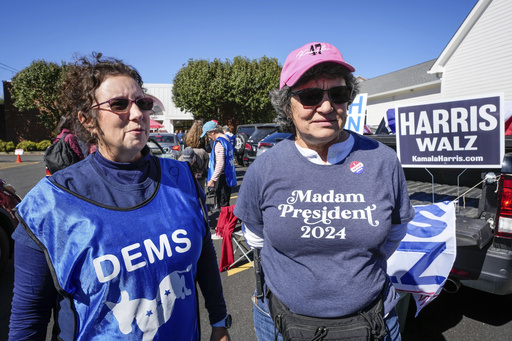
RUTHERFORDTON, N.C. — Renee Kyro, a loyal Republican, has cast her vote for Donald Trump for the third time in a row during presidential elections. This year, though, she is stepping up her involvement by volunteering to assist her neighbors in hurricane-stricken western North Carolina to ensure they have a voting plan amidst numerous precinct changes.
“I want to say I’m confident he wins, but I’m worried that people are just overwhelmed and may need some help or encouragement,” she expressed as she stood outside an early voting location in Rutherford County, known for its conservative support. “I just can’t imagine Kamala Harris as president.”
In contrast, Dia Roberts, located in the predominantly Democratic Winston-Salem, voiced her concerns by writing postcards promoting support for Harris, the Democratic nominee and current vice president.
“Donald Trump is a narcissist, a liar, a wannabe dictator,” Roberts remarked, identifying as an independent who has supported Democrats during Trump’s presidency. “This should not even be close.”
However, the race is proving to be quite competitive. The unfolding presidential battle in North Carolina comes as the region copes with the aftermath of Hurricane Helene, alongside a governor’s race in which the Republican candidate, Lt. Gov. Mark Robinson, is grappling with controversies that threaten GOP unity.
Both Trump and Harris are re-engaging with voters in North Carolina following the storm, with Trump scheduled for three appearances statewide on Monday, including a tour of the storm damage in Asheville. Former President Bill Clinton appeared last week alongside Harris’ running mate, Tim Walz, making additional stops in eastern North Carolina.
With just 15 days before the election, North Carolina holds significant importance in the Electoral College calculus that could determine whether Trump secures a second term or Harris makes history by becoming the first female president, and the second Black and first South Asian president in U.S. history.
“We are going to win or lose the presidency based on what happens in North Carolina,” noted Republican National Chairman Michael Whatley during a GOP bus tour last week.
While Pennsylvania has been the focus of Harris and Trump, both North Carolina and Georgia are critical battlegrounds with 16 electoral votes each. Four years ago, North Carolina was pivotal in Trump’s narrow victory of less than 75,000 votes compared to Biden.
The state is projected to cast around 5.5 million votes, and over 1 million ballots have already been submitted since early voting began last Thursday.
On Monday, Harris turned her attention to suburban voters in Pennsylvania, Michigan, and Wisconsin, engaging in dialogues with Republican Liz Cheney moderated by Sarah Longwell of Bulwark and conservative radio host Charlie Sykes.
Hurricane Helene has significantly impacted voting logistics, as many counties in North Carolina have relocated precincts and changed early voting locations. Thousands of citizens remain displaced, lacking both power and water as the early voting period unfolds.
Buncombe County, which includes the liberal city of Asheville, experienced severe damage. Appalachian State University in Boone remains closed, a critical source of Democratic support in the mountains. However, other surrounding counties boast a stronger Republican presence than the Democratic advantages in Asheville and Boone, leading both parties to adjust their outreach strategies.
“We’re working every channel we can, you know?” Whatley asserted, stating that the Republicans would utilize phone calls, direct mail, and digital platforms to inform voters about their polling locations.
Individuals like Kyro, residing near the devastated Chimney Rock area, acknowledged knowing numerous Trump supporters who have lost homes and others lacking reliable internet access, which could hinder their ability to find their polling locations. “I’ll go door to door if I have to,” she declared.
Despite their efforts, Trump and his party have not constructed the same campaign framework as Harris or President Joe Biden before he exited the race in July. “It was a flip of a coin before the storm,” noted GOP pollster Paul Shumaker, who emphasized the importance of rural voter turnout in comparison to urban and suburban participation.
State Senator Natalie Murdock, who is also the political director for the Democrats’ campaign in North Carolina, stated that their party possesses the necessary tools to connect with voters in disaster-stricken areas. Field staff from more than two dozen Democratic offices across the state are engaged in recovery efforts, distributing essential supplies. Murdock remarked that Appalachian State would reopen before the election, allowing students to vote at their regular precinct.
The political landscape in North Carolina remains dynamic, especially considering its trend of split-ticket voting during concurrent gubernatorial and presidential elections. Since 1992, the Democrats have only secured presidential electoral votes once, while Republicans have won the governor’s race just once in the same timeframe. Four years ago, Democratic Governor Roy Cooper was reelected by a margin of 4.5 points, despite Trump performing better than Biden.
Democrats aim to capitalize on Robinson’s recent controversies, which include CNN reporting that the state’s first Black lieutenant governor made inflammatory comments in the past. Robinson has denied these allegations and has initiated legal action against CNN for defamation.
During his recent campaign events, Walz took care to express condolences to Helene victims while committing to ongoing federal support and asserting that Robinson “will never be the governor of North Carolina.”
Murdock emphasized the Democratic strategy, insisting, “We are definitely making it clear how extreme the Republican ticket is.”
Trump’s strong influence over the GOP has potentially shifted some support toward Harris, according to Robert Brown, a High Point attorney who attended a recent event featuring Walz. Brown, who once served as the state director for John McCain’s campaign, switched to register as an independent and supported Hillary Clinton after Trump’s nomination in 2016. “This really isn’t that hard for me and for some other Republicans and former Republicans,” he commented, expressing his disillusionment with the Republican Party’s direction.
